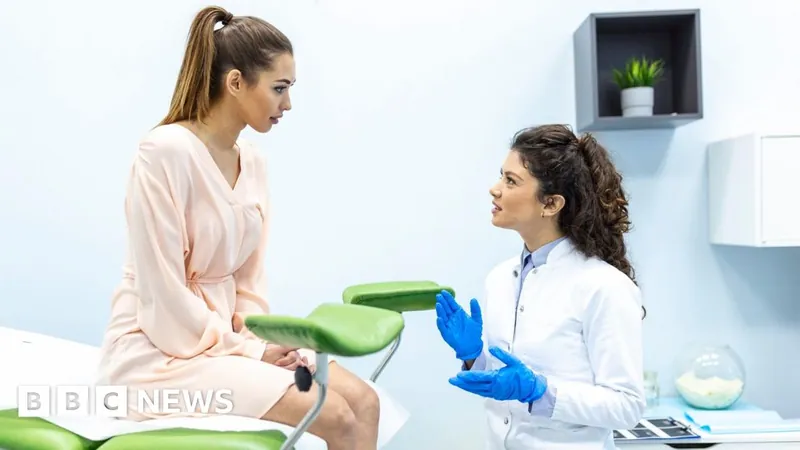
Unseen Dangers: The Shocking Knowledge Gap in Cervical Screening That's Costing Lives!
2025-01-20
Author: Li
Unseen Dangers: The Shocking Knowledge Gap in Cervical Screening That's Costing Lives!
A significant knowledge gap surrounding cervical screenings is alarmingly "costing lives," according to reports from a leading cancer charity, The Eve Appeal. Recent research highlights that many women remain uninformed about their rights to request various adjustments during their cervical screenings, a procedure that can often be painful, uncomfortable, or anxiety-inducing.
This essential test, which plays a critical role in detecting human papillomavirus (HPV)—the virus responsible for cervical cancer—saves an estimated 5,000 lives annually in the UK. Nevertheless, a staggering number of eligible women choose not to participate in these routine screenings. Recent data from NHS England indicates that over five million women aged between 25 and 64 are not up to date with their screenings. Among these, the lowest participation rates are seen in women aged 25 to 29, with only 58% opting to get screened.
Athena Lamnisos, the chief executive of The Eve Appeal, expressed her concerns, stating that the barriers preventing women from accessing screenings can be easily addressed. "There are really simple, straightforward things that you can ask for that patients just aren't aware of....basically, you can take control," she emphasized.
Understanding Your Rights During Cervical Screenings
The charity’s survey, involving more than 1,100 women, was conducted as part of the build-up to Cervical Cancer Prevention Week. The findings revealed a critical need for women to understand that they can request adjustments during their screenings, including: - Changing to more comfortable positions during the test. - Requesting to pause or stop the procedure if experiencing discomfort. - Scheduling double appointments to avoid feeling rushed. - Asking for additional lubrication to ease the procedure. - Guiding or inserting the speculum themselves. - Bringing a friend or support person along for comfort.
Addressing Marginalization in Health Access
Moreover, the charity points out that marginalized groups, such as disabled individuals and those with health conditions or language barriers, often feel particularly disadvantaged when it comes to accessing cervical screenings. Lamnisos reiterated that eliminating these challenges and bridging information gaps is crucial for saving lives.
Personal Experiences in Advocacy
For instance, Eve Hewitt, a woman with Crohn’s disease who has experienced surgical complications, shared her personal experience with cervical screenings. She advocates for herself by requesting smaller speculums and double appointments to alleviate potential anxiety related to pain and discomfort. "Being prepared and knowing I can advocate for myself makes a huge difference," she noted, emphasizing the importance of open communication and preparation ahead of the appointment.
The Future of Cervical Cancer Prevention
Looking ahead, NHS England is working towards an ambitious goal of eliminating cervical cancer by 2040, relying heavily on the effectiveness of cervical screenings and the HPV vaccination program, which has already shown a 90% reduction in cervical cancer cases in the country. Despite this promising data, NHS officials remind the public that even vaccinated individuals are still required to attend regular screenings, as a small risk of developing cervical cancer remains.
Take Control of Your Health!
The reality is clear: addressing the knowledge gap surrounding cervical screenings is not just a matter of education—it's a vital step in saving lives. Women and individuals with a cervix must feel empowered and informed to take control of their health and seek the care they need. If you or someone you know is due for a cervical screening, don't hesitate to ask questions and request the accommodations that make the experience easier and less daunting. Your health is worth it!

 Brasil (PT)
Brasil (PT)
 Canada (EN)
Canada (EN)
 Chile (ES)
Chile (ES)
 Česko (CS)
Česko (CS)
 대한민국 (KO)
대한민국 (KO)
 España (ES)
España (ES)
 France (FR)
France (FR)
 Hong Kong (EN)
Hong Kong (EN)
 Italia (IT)
Italia (IT)
 日本 (JA)
日本 (JA)
 Magyarország (HU)
Magyarország (HU)
 Norge (NO)
Norge (NO)
 Polska (PL)
Polska (PL)
 Schweiz (DE)
Schweiz (DE)
 Singapore (EN)
Singapore (EN)
 Sverige (SV)
Sverige (SV)
 Suomi (FI)
Suomi (FI)
 Türkiye (TR)
Türkiye (TR)
 الإمارات العربية المتحدة (AR)
الإمارات العربية المتحدة (AR)